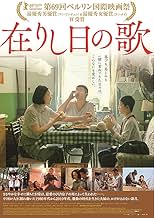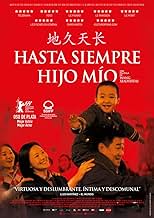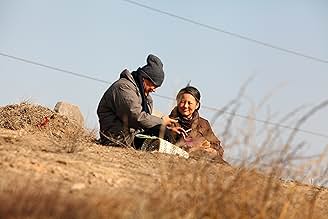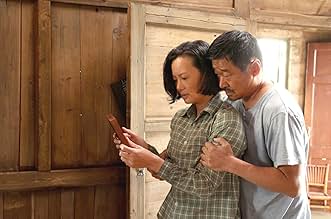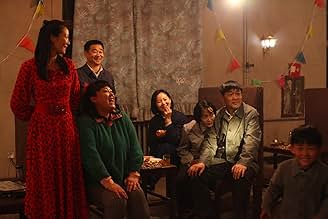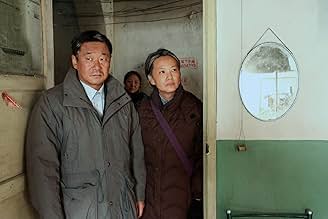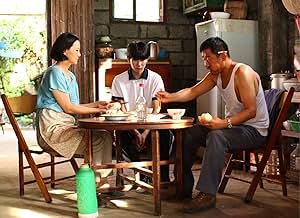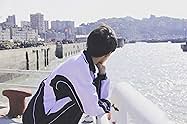Di jiu tian chang
- 2019
- 3 h 5 min
AVALIAÇÃO DA IMDb
7,7/10
5,9 mil
SUA AVALIAÇÃO
Dois casais estão se adaptando às grandes mudanças sociais e econômicas que estão ocorrendo na China dos anos 80 até o presente.Dois casais estão se adaptando às grandes mudanças sociais e econômicas que estão ocorrendo na China dos anos 80 até o presente.Dois casais estão se adaptando às grandes mudanças sociais e econômicas que estão ocorrendo na China dos anos 80 até o presente.
- Direção
- Roteiristas
- Artistas
- Prêmios
- 43 vitórias e 60 indicações no total
Yanguozhang Zhao
- Xinjian Zhang
- (as Yangouzhang Zhao)
- Direção
- Roteiristas
- Elenco e equipe completos
- Produção, bilheteria e muito mais no IMDbPro
Avaliações em destaque
What a beautiful story about what it means to be a parent in this world and how we are all connected.
The story is told by jumping back and forth in time, a flow of scenes giving the viewer a glimpse of the changes in the life of a couple who lost their son and how they try to move on with this loss. Although they abondon old friends after the incident a connection remains and in the end the lives of this group of people comes full circle.
This film brings the message of everyone being connected to another and the importance to sincerely care about others to the screen in such a wonderful way with an incredible cast. The three hours felt so short but something still remains, just like in life when one is touched by the goodness of others.
Highly recommend this movie.
The story is told by jumping back and forth in time, a flow of scenes giving the viewer a glimpse of the changes in the life of a couple who lost their son and how they try to move on with this loss. Although they abondon old friends after the incident a connection remains and in the end the lives of this group of people comes full circle.
This film brings the message of everyone being connected to another and the importance to sincerely care about others to the screen in such a wonderful way with an incredible cast. The three hours felt so short but something still remains, just like in life when one is touched by the goodness of others.
Highly recommend this movie.
In very many ways this film is almost a reboot of Zhang Yimou's film To Live, from 1994, which tells the many trials and tribulations of a family from the founding of the People's Republic in 1949 to the end of the Cultural Revolution in 1976. So Long My Son picks up that chronological baton, and tells a story about family bonds, the meaning of friendship and what constitutes our morals and ethics through the last 30/40 years of Chinese history, from a stilted, materially basic time of 1980 through to the hypermodernity of China in the 2010s.
In the same way To Live aimed thinly disguised critiques at the Chinese government's policies through showing its impact on ordinary people, So Long My Son fires a number of shots too and it's in fact a little surprising to me some of these have been overlooked by the censors. The most obvious of them is the criticism of the one child policy, but hidden in there too are mentions of the privatisation of state owned industries in the early 90s and the mass redundancies that went with them, as well as criticism of the wealth inequality of modern China that has ensued from the market economy transition of the 80s and 90s.
I'm unsure if this was a problem specific to the release version I saw, though I have seen other reviews saying the plot was hard to follow, but I noticed that the English subtitles was often only translating about 1/5 of the dialogue in Mandarin. As a speaker of both, I followed the plot and characters quite easily, but can absolutely understand why many reviewers and comments have said they found the characters and plots hard to distinguish if the subtitling was a problem. However, with one eye on the subtitles, I think the fact they were missing a lot of the Mandarin dialogue would have created a really dreamy plotline that complements well the cinematographic style deployed - long panoramic shots that suddenly cut into a character's perspective; languid sequences that soak in the environment; and shots designed to make the audience feel voyeurs in a private situation.
In the same way To Live aimed thinly disguised critiques at the Chinese government's policies through showing its impact on ordinary people, So Long My Son fires a number of shots too and it's in fact a little surprising to me some of these have been overlooked by the censors. The most obvious of them is the criticism of the one child policy, but hidden in there too are mentions of the privatisation of state owned industries in the early 90s and the mass redundancies that went with them, as well as criticism of the wealth inequality of modern China that has ensued from the market economy transition of the 80s and 90s.
I'm unsure if this was a problem specific to the release version I saw, though I have seen other reviews saying the plot was hard to follow, but I noticed that the English subtitles was often only translating about 1/5 of the dialogue in Mandarin. As a speaker of both, I followed the plot and characters quite easily, but can absolutely understand why many reviewers and comments have said they found the characters and plots hard to distinguish if the subtitling was a problem. However, with one eye on the subtitles, I think the fact they were missing a lot of the Mandarin dialogue would have created a really dreamy plotline that complements well the cinematographic style deployed - long panoramic shots that suddenly cut into a character's perspective; languid sequences that soak in the environment; and shots designed to make the audience feel voyeurs in a private situation.
An immense emotional masterpiece with intellectual vibrations which invites the audience, through the crossed gaze of several Chinese families, to question the universality of the feeling of filiation and the meaning of existence. A magisterial and bitter melodrama. 7/8 of 10.
Saw this at the Berlinale 2019, where it was part of the official Competition. Two prizes were awarded: Silver Bear for Best Actor (Wang Jingchun) and one Silver Bear for Best Actress (Yong Mei). Apart from the acting, it was very interesting to see China transform in thirty years time, albeit that we see only a rural part of China, far away from the big city centers, thus avoiding large scale business and touristic areas.
Showing China while undergoing a drastic change, is one of the main themes of this movie, if not the main one. From a side line we get to see the transformation in progress, going from a communist country towards modern (semi?) capitalism. Factories, workplaces and houses the people work and live in, seem carefully designed to be true to the reality of the times at hand, thereby demonstrating an admirable attention for details.
A perfect example was the factory closure. The gathering with the workers was very illustrative. It showed that such things went in communist times exactly as how it goes nowadays. The workers assembled can protest and find that the director must be sent away. The harsh reality was (of course) in communist times exactly as in our capitalist times. Jobloss overcomes the humble workers, as if it was a natural disaster. There is nothing they can do about it, regardless of all being called "comrades". Neither can help be found in communist textbooks and the principles of "worker's self management".
On the other hand, regarding the implicit second theme, the family related stories of the protagonists, the developments were difficult to follow for me. This was partly due to some unnecessary time jumps and flash backs, partly caused by not telling who-is-who when a new protagonist appears, partly because of me being unable to tell Chinese people apart. Though the story starts with a fatal drowning accident, the people involved will re-unite in the end and will live happily ever after, even when the real truth comes out thirty years later, and even after someone admits having played a dark role in the accident.
It is no problem to sit out the three hours this movie lasts, though not really involving on a human level. And it was certainly not moving or heart-breaking as per what other reviewers wrote. The ground cause for this psychological distance is (see above) the difficulties I had to follow the persons involved, besides the fact that their logic was failing on me a few times.
All in all, I was glad to have seen this movie, regardless of my problems with following the various personal story lines and their interwoven connections. The nearly three hours are easy to sit through, so no problem there. And the ending was a surprise (no details, no spoilers), particularly because it did not cause a hard break in relationships, despite there would have been ample reason for a break-up after admitting a few 30-year-old lies.
Showing China while undergoing a drastic change, is one of the main themes of this movie, if not the main one. From a side line we get to see the transformation in progress, going from a communist country towards modern (semi?) capitalism. Factories, workplaces and houses the people work and live in, seem carefully designed to be true to the reality of the times at hand, thereby demonstrating an admirable attention for details.
A perfect example was the factory closure. The gathering with the workers was very illustrative. It showed that such things went in communist times exactly as how it goes nowadays. The workers assembled can protest and find that the director must be sent away. The harsh reality was (of course) in communist times exactly as in our capitalist times. Jobloss overcomes the humble workers, as if it was a natural disaster. There is nothing they can do about it, regardless of all being called "comrades". Neither can help be found in communist textbooks and the principles of "worker's self management".
On the other hand, regarding the implicit second theme, the family related stories of the protagonists, the developments were difficult to follow for me. This was partly due to some unnecessary time jumps and flash backs, partly caused by not telling who-is-who when a new protagonist appears, partly because of me being unable to tell Chinese people apart. Though the story starts with a fatal drowning accident, the people involved will re-unite in the end and will live happily ever after, even when the real truth comes out thirty years later, and even after someone admits having played a dark role in the accident.
It is no problem to sit out the three hours this movie lasts, though not really involving on a human level. And it was certainly not moving or heart-breaking as per what other reviewers wrote. The ground cause for this psychological distance is (see above) the difficulties I had to follow the persons involved, besides the fact that their logic was failing on me a few times.
All in all, I was glad to have seen this movie, regardless of my problems with following the various personal story lines and their interwoven connections. The nearly three hours are easy to sit through, so no problem there. And the ending was a surprise (no details, no spoilers), particularly because it did not cause a hard break in relationships, despite there would have been ample reason for a break-up after admitting a few 30-year-old lies.
I saw it as a honest - precise portrait of contemporary China. And as realistic, warm image of the essence of parenthood. A profound iuseful film for so many motives than it is unfair to define one of them because, I suppose, each viewer discovers something precious in this film about relations, children, names, fury and love at intense levels and, more important, about truth to yourself.
Você sabia?
- CuriosidadesThe film explores the consequences across three decades of China's onetime one-child policy which lasted from 1979-2013.
- Erros de gravaçãoWhen Hao Shen's mother died, he wore a black cloth on his left arm. However, in most areas of China, especially in northern China, it is a folk custom for children to wear a black cloth on their right arm after the death of mother.
- ConexõesReferenced in Estrenos Críticos: Septiembre 2019 (2019)
- Trilhas sonorasAuld Lang Syne
Traditional tune, lyrics by Robert Burns
Principais escolhas
Faça login para avaliar e ver a lista de recomendações personalizadas
- How long is So Long, My Son?Fornecido pela Alexa
Detalhes
Bilheteria
- Faturamento bruto mundial
- US$ 8.096.596
- Tempo de duração
- 3 h 5 min(185 min)
- Cor
- Proporção
- 1.78 : 1
Contribua para esta página
Sugerir uma alteração ou adicionar conteúdo ausente

![Assistir a Trailer [OVS]](https://m.media-amazon.com/images/M/MV5BZThlNmFjNjAtNjkwZS00NTU1LWJkM2ItZGIyNmVlZDRmMGM5XkEyXkFqcGdeQXRyYW5zY29kZS13b3JrZmxvdw@@._V1_QL75_UX500_CR0)
